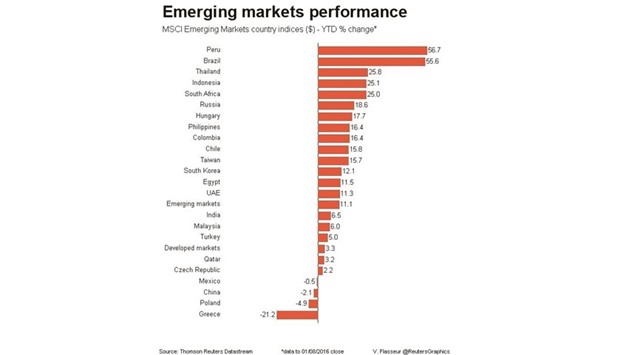Emerging-market stocks retreated from their highest level in a year and currencies halted four days of gains as oil’s descent into a bear market weighed on energy producers amid concern over the outlook for the global economy.
Shares in Russia and the oil-exporting Gulf region led losses as oil traded near $40 a barrel in New York after tumbling to the lowest close since April on Monday.
South Africa’s rand and Malaysia’s ringgit slid the most among currencies. Polish stocks and the zloty bucked the trend, rallying the most worldwide, after proposed legislation spared banks the immediate cost of converting $36bn of Swiss-franc home loans into zloty.
Equities retreated as investors turned their focus on the global economy after speculation that central banks will boost stimulus and the US will keep interest rates lower for longer amid lacklustre growth sent valuations to the highest level since May 2015. Japan’s plan for extra government spending to boost the world’s third-largest economy underwhelmed investors.
“Markets are likely to be cautious going into August, given volatility is generally lower, solid summer performance thus far and the wariness of any surprises around the corner,” said Simon Quijano-Evans, a strategist at Legal & General Group in London. “The growth and oil price concerns appear to be the dominating factors today.”
Currencies in emerging markets tend to underperform this month, falling in seven of the past 10 Augusts, as some investors cut holdings of assets considered to be riskier in case they’re caught out while on vacation. Liquidity in foreign-exchange trading dropped a majority of the time, according to Bank of America Corp data.
The MSCI Emerging Markets Index lost 0.5% to 878.33 in London, sliding from its highest level since August 2015. All but one of the 10 industry groups fell with consumer discretionary shares leading losses. Developing-nation companies are trading at 12.3 times their 12-month estimated earnings, compared with 15.7 for developed markets.
Russia’s Micex Index fell 1.4% as Lukoil lost 2.8%. Stocks in Abu Dhabi, Dubai and Saudi Arabia fell at least 1.2%.
“Oil prices are once again the source of major pressure on emerging markets,” said Rakpong Chaisuparakul, an investment strategist at KGI Securities (Thailand) in Bangkok. “Most investors are also worried about high valuations of some stocks after their recent rallies. Some may take this opportunity to take profit.”
Polish banks Powszechna Kasa Oszczednosci Bank Polski SA and Bank Zachodni WBK led gains in Warsaw, sending the WIG 20 Index up 2.1%. Polish President Andrzej Duda’s proposals envisage gradual conversion of Swiss-franc-denominated loans into zloty through regulatory changes, central bank Governor Adam Glapinski told reporters yesterday.
Chinese stocks rose the most in a week, with developers helping pace an afternoon advance in thin trading. A typhoon shuttered Hong Kong’s markets for the day.
Bharat Financial Inclusion, the Indian microfinance company formerly known as SKS Microfinance, slumped 8.8%, the most since September in Mumbai stock trading after financial-crimes investigators arrested its president.
The MSCI Emerging Markets Currency Index fell less than 0.1% after four days of gains, which took it to its highest level since July 2015. The rand weakened 0.5% and the ringgit slid 0.3%.

.
